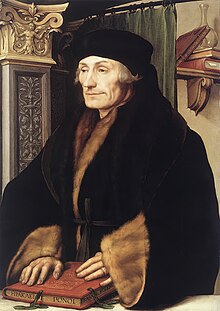
Back Desiderius Erasmus Afrikaans Erasmus von Rotterdam ALS Erasmo de Rotterdam AN إيراسموس Arabic ايراسموس ARZ Erasmu de Rotterdam AST Desiderius Erasmus Aymara Rotterdamlı Erazm Azerbaijani Эразм Ратэрдамскі Byelorussian Эразм Ратэрдамскі BE-X-OLD
Desiderius Erasmus | |
|---|---|
 | |
| Born | c. 28 October 1466 |
| Died | 12 July 1536 (aged 69) Basel, Old Swiss Confederacy |
| Other names | Desiderius Erasmus Roterodamus |
| Known for | New Testament translations and exegesis, satire, pacificism, letters, author and editor |
| Awards | Counsellor to Charles V. (hon.) |
| Academic background | |
| Education | |
| Influences | |
| Academic work | |
| Era | Northern Renaissance |
| School or tradition | |
| Institutions | |
| Main interests | |
| Notable works | |
| Notable ideas |
|
| Influenced | |
| Ecclesiastical career | |
| Religion | Christianity |
| Church | Catholic Church |
| Ordained | 25 April 1492 |
| Part of a series on the |
| Textus Receptus |
|---|
 |
|
|
Desiderius Erasmus Roterodamus (/ˌdɛzɪˈdɪəriəs ɪˈræzməs/ DEZ-i-DEER-ee-əs irr-AZ-məs; Dutch: [ˌdeːziˈdeːrijʏs eːˈrɑsmʏs]; 28 October c. 1466 – 12 July 1536), commonly known in English as Erasmus of Rotterdam or simply Erasmus, was a Dutch Christian humanist, Catholic priest and theologian, educationalist, satirist, and philosopher. Through his vast number of translations, books, essays, prayers and letters, he is considered one of the most influential thinkers of the Northern Renaissance and one of the major figures of Dutch and Western culture.[1][2]
Erasmus was an important figure in classical scholarship who wrote in a spontaneous, copious and natural Latin style.[note 1] As a Catholic priest developing humanist techniques for working on texts, he prepared pioneering new Latin and Greek scholarly editions of the New Testament and of the Church Fathers, with annotations and commentary that were immediately and vitally influential in both the Protestant Reformation and the Catholic Reformation. He also wrote On Free Will, The Praise of Folly, The Complaint of Peace, Handbook of a Christian Knight, On Civility in Children, Copia: Foundations of the Abundant Style and many other popular and pedagogical works.
Erasmus lived against the backdrop of the growing European religious reformations. He developed a biblical humanistic theology in which he advocated the religious and civil necessity both of peaceable concord and of pastoral tolerance on matters of indifference. He remained a member of the Catholic Church all his life, remaining committed to reforming the church from within. He promoted the traditional[citation needed][according to whom?] doctrine of synergism, which some prominent reformers such as Martin Luther and John Calvin rejected in favor of the doctrine of monergism. His influential middle-road approach disappointed, and even angered, partisans in both camps.
- ^ Tracy, James D. "Desiderius Erasmus Biography & Facts". Encyclopædia Britannica. Archived from the original on 29 May 2018. Retrieved 29 May 2018.
- ^ Sauer, J. (1909). Desiderius Erasmus Archived 13 June 2010 at the Wayback Machine. In The Catholic Encyclopedia. New York: Robert Appleton Company. Retrieved 10 August 2019 from New Advent: http://www.newadvent.org/cathen/05510b.htm Archived 13 June 2010 at the Wayback Machine
- ^ Cite error: The named reference
encycwas invoked but never defined (see the help page).
Cite error: There are <ref group=note> tags on this page, but the references will not show without a {{reflist|group=note}} template (see the help page).